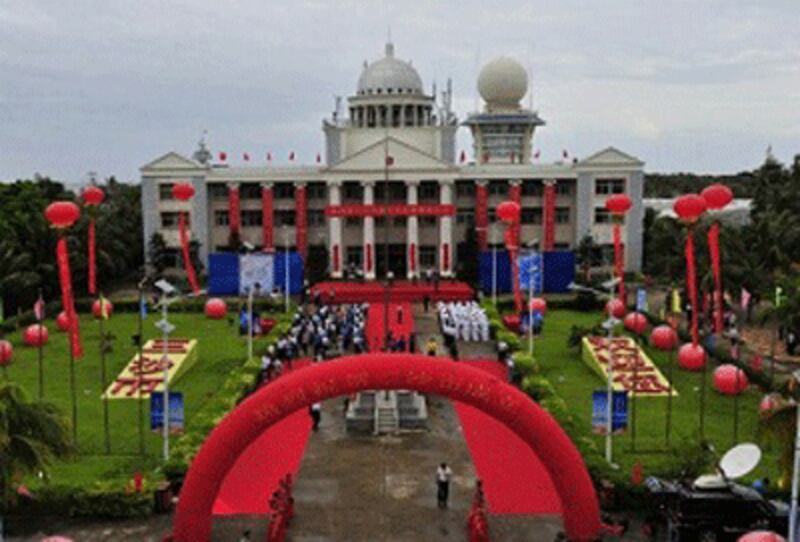The United States and China crossed swords again at the weekend over security in the South China Sea—this time over Beijing's decision to set up a new military garrison in the disputed waters.
As the exchange of words between the two powers intensified a week after China moved to establish a tiny city and a garrison in the disputed Paracel chain, Vietnamese police on Sunday arrested dozens of people protesting against Beijing's maritime claims.
China established Sansha city on a remote island, 350 kilometers (220 miles) from its southernmost province on July 24, in a bold bid to administer the vast South China Sea and assert control over disputed and potentially oil-rich islands in the vast sea.
Vietnam and U.S. treaty ally the Philippines protested the move and accused Beijing of stepping up harassment at sea.
At the weekend, the Chinese foreign ministry summoned the number two at the U.S. Embassy in China to protest against a statement by the U.S. State Department on Friday which accused Beijing of risking an escalation in tensions by establishing Sansha city and the garrison.
The State Department also strongly backed diplomatic efforts by Southeast Asian nations to negotiate with China over their maritime territorial claims.
"We are concerned by the increase in tensions in the South China Sea and are monitoring the situation closely," U.S. State Department spokesman Patrick Ventrell said in the statement Friday.
"In particular, China's upgrading of the administrative level of Sansha city and establishment of a new military garrison there covering disputed areas of the South China Sea run counter to collaborative diplomatic efforts to resolve differences and risk further escalating tensions in the region," he said.
Controversial talks

The U.S. statement came after controversial annual talks last month by the 10-member Association of Southeast Asian Nations (ASEAN), which for the first time in its 45-year history failed to issue a joint statement.
The ASEAN impasse came as meeting host Cambodia, China's key ally in Southeast Asia, rejected a proposal by the Philippines and Vietnam to mention their separate territorial disputes with China.
Assistant Chinese Foreign Minister Zhang Kunsheng called in the U.S. Embassy's Deputy Chief of Mission Robert Wang, saying the State Department statement "sent a seriously wrong message."
Wang was told to convey Beijing's message to the "highest level" of the U.S. government.
"The [U.S.] statement, which ignores facts and deliberately confuses right and wrong, is an apparent interference in the internal affairs of China, and reflects the U.S. ambition of manipulating Asian affairs," China's official news agency Xinhua said.
Chinese foreign ministry spokesman Qin Gang repeated Beijing's claim that China has absolute sovereignty over the sea and its myriad islands and has every right to formally set up a city to administer the region.
"Setting up Sansha city is the Chinese government's necessary adjustment of the current administrative agencies, which is completely within China's sovereignty," he said.
Xinhua said that although Washington claims that it does not take a position on territorial disputes in the South China Sea, it "selectively takes sides in these disputes."
"By doing so, Washington intends to alienate China from countries around the South China Sea," it charged.
'Strong and independent'
The U.S. Senate last week said Washington is committed to assisting Southeast Asian nations to remain "strong and independent," urging restraint among states staking overlapping territorial claims in the South China Sea—China, Taiwan, the Philippines, Vietnam, Malaysia, and Brunei.
The South China Sea, which is believed to contain vast oil and gas reserves, has become Asia's biggest potential military flashpoint, experts say.
China and the Philippines were locked in a standoff at a horseshoe-shaped reef in waters that both claim earlier this year after Manila accused Chinese fishermen of poaching in its exclusive economic zone. Both sides had sent government ships to the area.
Vietnam has faced its own problems with China, mostly resulting from Beijing's detention of Vietnamese fishermen in disputed waters.
Hanoi has also protested a recent announcement by the state Chinese oil company opening nine oil and gas lots for international bidders in areas that overlap existing Vietnamese exploration blocks. Last month, Vietnam adopted a law that places the hotly disputed Spratly Islands under Hanoi's sovereignty.
Vietnamese protests
Anti-China demonstrations have been staged weekly by Vietnamese activists under the watchful eyes of the police.
But on Sunday, Vietnamese police detained up to 50 people as they broke up a protest in Hanoi against Beijing's territorial claims, witnesses told RFA's Vietnamese service.
The arrest took place before and during the protest, the fourth such rally in just over a month. There were no arrests at the previous three.
At least four prominent bloggers and one elderly activist were held for participating in the latest rally, U.S.-based Human Rights Watch said.
The arrests show Vietnam is "trampling on its commitments to respect civil and political rights guaranteed by international human rights treaties ratified by the government," Human Rights Watch's Asia deputy director Phil Robertson said.
Reported by RFA's Mandarin and Vietnamese services. Written in English with additional reporting by Parameswaran Ponnudurai.
